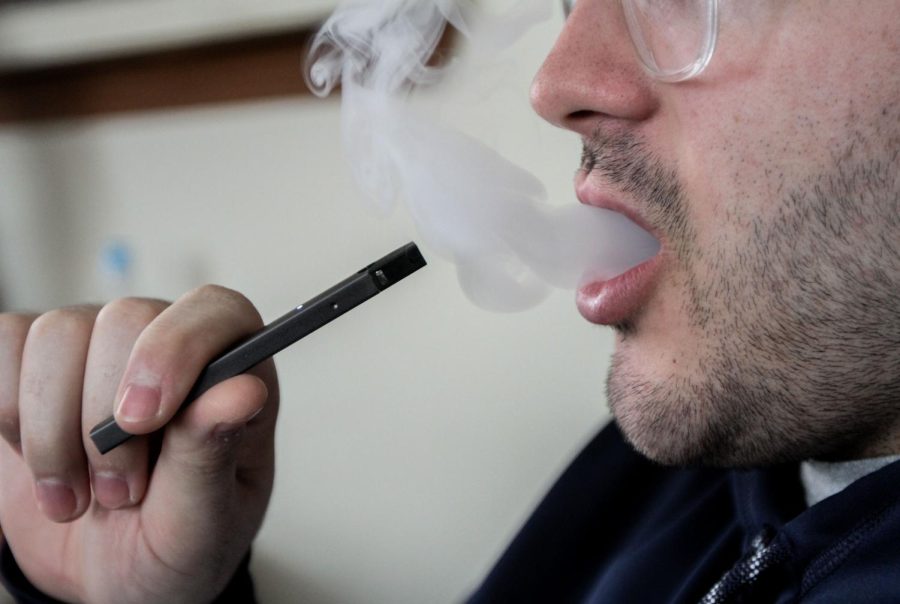Students open up about JUUL use on campus despite smoking ban
March 3, 2018
Kent State is just four months from the one-year anniversary of the university-instituted smoking ban on campus.
The smoking ban was originally placed on Kent’s campus to set a positive example and provide a smoke-free environment for students and faculty.
As colleges around the country are continuing to implement the smoking ban with the “Let’s Clear the Air Campaign,” students are using JUUL on campus as a more discreet use of nicotine than a vaporizer or e-cigarette.
JUUL was created in 2017 by James Monsees and Adam Bowen as a smoking alternative for adults.
According to the company’s testimonials, the JUUL vaporizer has “regulated temperature control and uses nicotine salts as found in the tobacco leaf rather than free-base nicotine, unlike standard e-cigarettes.”
JUUL user and junior marketing major Adam Freed said one JUUL pod usually lasts him two days.
When asked if he thinks his health could be affected with long term use, Freed said he knew what he was putting into his body.
“Of course,” Freed said. “Nothing should be going through your lungs but air. Being 21 years old, it’s hard to watch 15-year-olds carry them around. I mostly use my JUUL for a quick buzz, but because that buzz is so short, I find myself using it too often.”
Senior fashion merchandising major Avery Niernberger expressed concern for the new fad on Kent’s campus.
“JUULs are just another ‘trend’ right now unfortunately,” Niernberger said. “The scary thing is that since they’re so new, no one truly knows the side effects they will bring to people. And right now my generation loves them, so I can only hope they won’t affect my peers deeply.”
According to the policy, “smoking” is defined as inhaling, exhaling, burning or carrying any lighted or heated product intended for inhalation in any manner or form.
This includes the use of an apparatus that creates an aerosol or vapor in any manner or form, meaning that e-cigarettes and other vaping devices are prohibited.
However, students continue to use JUUL on campus despite the ban because of its discreet size.
“I’m aware of the policy,” Freed said. “Although I don’t use my JUUL on campus, I’ve seen a variety of students blatantly walk around with them. I’ve never heard of anyone getting sent to student conduct for failure to follow the ban, so that’s probably why people continue to use them.”
Scott Dotterer, a coordinator in the Office of Health Promotion, voiced his opinion on the new technology.
“Nicotine is an extremely addictive drug,” Dotterer said. “Moreover, the U.S. Surgeon General has cautioned that vaping is a public health concern. It’s important to note that KSU has made great strides in implementing a smoke-free, tobacco-free policy. In addition, Kent State has a wealth of resources for students, faculty and staff.”
While traditional cigarette usage has dropped in recent years, newer electronic cigarettes exploded in popularity. A 2016 Surgeon General’s report concerning electronic cigarette use among youth and adults indicated that e-cigarette use among American youth increased 900 percent between 2011 and 2015.
According to the same report, e-cigarette use surpassed the use of conventional tobacco products, “including cigarettes, cigars, chewing tobacco and hookahs.”
Despite concerns over smoking apparatuses like JUUL, the U.S. Food and Drug Administration rules indicate the company won’t have to apply to market and sell its product until 2021.
Dotterer urges students to utilize University Health Services if they need help quitting by using the American Lung Association’s Freedom From Smoking Program.
“This program is free and it’s highly structured with a systematic approach to quitting,” Dotterer said. “The program includes eight sessions over seven weeks and each session is about 45 to 60 minutes and includes a logical progression from awareness of nicotine dependence to changing behavior and lifestyle.”
For more information on the program, students can contact the Office of Health Promotion at 330-672-8265 or schedule an appointment with University Health Services by emailing Sierra Baker at [email protected].
“I believe the new smoke-free, tobacco-free policy will be impactful over time,” Dotterer said. “Behavior change can certainly be challenging however, the new policy represents environmental management that may encourage those who smoke to reconsider behaviors that are detrimental to their health.”
Meghann Morrow is the student affairs reporter. Contact her at [email protected].

























